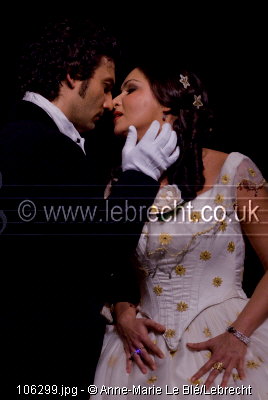|
|
|
|
|
|
|
|
| classicalsource |
| Alexander Campbell |
Verdi: La traviata, Royal Opera House, 14 January 2008
|
The Royal Opera – La Traviata
|
|
|
 The Royal Opera had obviously been banking on a
success with this the tenth revival of Richard Eyre’s production of Verdi's
“La traviata” and, on paper at least, is cast from strength with the much
promoted and glamorous Anna Netrebko as Violetta, Dmitri Hvorostovsky and,
‘tenor of the moment’, Jonas Kaufmann. It is sad to report that the evening
did not take fire. The Royal Opera had obviously been banking on a
success with this the tenth revival of Richard Eyre’s production of Verdi's
“La traviata” and, on paper at least, is cast from strength with the much
promoted and glamorous Anna Netrebko as Violetta, Dmitri Hvorostovsky and,
‘tenor of the moment’, Jonas Kaufmann. It is sad to report that the evening
did not take fire.
In the orchestra pit, things were somewhat wayward. From the Act One Prelude
onwards Maurizio Benini seemed reluctant to keep any regular tempo for more
than a few bars and some of his rubato were extreme. This stop-go approach
seemed essentially to be there to indulge the singers. This meant that
ensemble was not always precise and one could only marvel how the woodwinds
managed to fit in their triplets at the variable speeds. String ensemble was
not always perfect and the ‘Preludes’ to the first and final acts lacked
cohesion, and were not as atmospheric as they can be. In the final act,
Verdi’s musical depiction of Violetta’s failing heartbeats seemed even more
erratic than usual. The ECG would have been interesting to see!
Richard Eyre’s production has stood the test of time well and has been the
showcase for some good interpreters of the principal roles, particularly of
the eponymous heroine. Regular attendees will remember Angela Gheorghiu’s
glamorous and beautifully vocalised Violetta when the production was new.
Following her impressive Gilda for Royal Opera a few years ago, expectations
of Netrebko’s Violetta were high. In the first act she did not appear
entirely at ease either vocally or temperamentally. Much of her music was
delivered without nuance, tonal variety or dynamic contrasts. Just
occasionally interesting interpretative insights registered, such as a
curious moment of introspection at the end of the ‘Brindisi’, but at crucial
moments such as the lead-in to ‘Sempre libera’ she seemed content to turn
her back on the audience and sing at the back wall. This is surely a moment
when you need to actually see the character’s face. Her coloratura was not
as precise or dazzling here as one might have expected.
Later on there was more subtlety to both her vocalism and interpretation
although as far as the latter was concerned it was evident only fitfully.
Dramatic points were made with a fussiness that seemed mannered, and
Netrebko has yet to fully consider the dramatic potency of stillness.
Overall her portrayal was not a dramatically convincing and consistent in
charting the character’s development and predicament. One of the problems of
hype is that however marvellous you sound as recorded and look on posters
you have to deliver the goods in a performance – she failed to convince and
impress.
Jonas Kaufmann was a vocally assured Alfredo, and alone of the three main
protagonists you could hear every word he sang. However, despite some finely
shaded, legato and beautiful-pianissimo singing, he did not sound on his
best form and seemed under-powered. Alfredo is a hard part to carry off
dramatically, as the singer has to develop from the somewhat timid
love-struck youth and yet display a fiery intemperate side as well. Kaufmann
struck a good balance and presented an interesting profile of the character.
Dmitri Hvorostovsky has sung the part of Giorgio Germont in earlier revivals
of this production and his interpretation of the part has now deepened. His
dramatic portrayal brings out the rather unfeeling, staid and almost cruel
nature of the man – particularly in the moment when Violetta asks him to
embrace her as his daughter and he steps back from the physical contact.
Hvorostovsky sang as a true Verdian and was an absolute pleasure to hear,
even at Benini’s sagging tempo in ‘Di Provenza…’.
Some of the smaller roles in this opera can be brought vividly to life even
though the characters have little to sing other than a few asides.
Monika-Evelin Liiv with her rich mezzo made much of Flora, and Sarah Pring’s
Annina displayed distinct ‘attitude’ towards Alfredo in Act Two and then a
touching softening of approach in the final act – a nice touch. Mark
Beesley’s Doctor Grenvil was also suitably aware of the impending tragedy in
the final act. (Why is it that operatic doctors so rarely succeed in saving
their patients?) Eddie Wade delivered an appropriately pompous Baron
Douphol. Sadly, Ji-Min Park’s Gastone was almost inaudible during the
Spanish interlude at Flora’s party, although he made his presence felt in
the first act.
Eyre’s production as revived by Patrick Young and Bob Crowley’s designs
continue to look well and are atmospherically lit, and the chorus was as
disciplined as ever. Ultimately the evening did not live up to expectations
although it was greeted with enthusiastic responses from some areas of the
auditorium. Those with long operatic memories that stretch back to Cotrubas
and Gheorghiu – both very different and affecting Violettas – would (even
without the rose-tinted recall of memory) have found this performance
lacking that special ‘something’ to set it apart. |
|
|
|
|
|
|
|
|
|
|
|
|
|
|
|
|
|
|